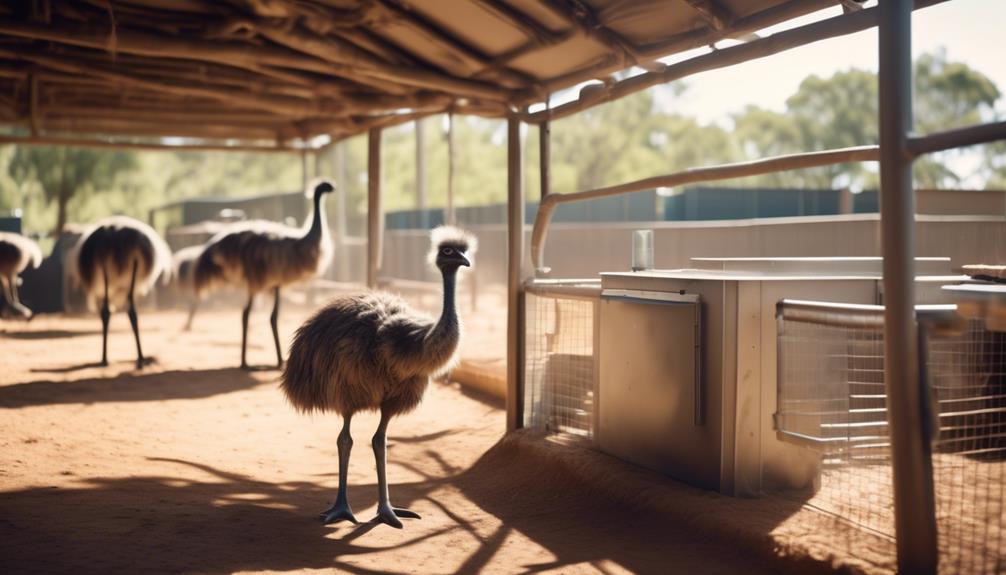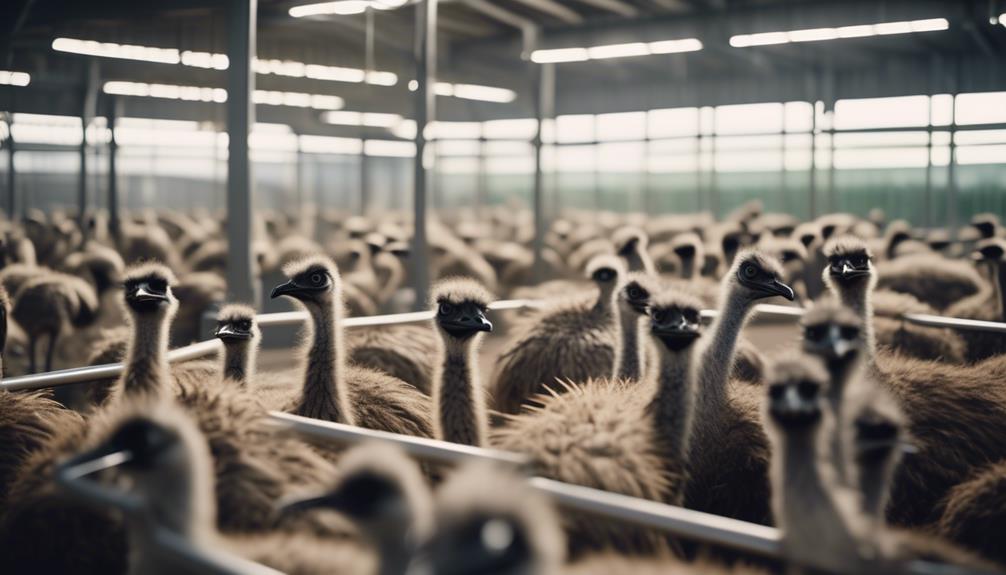
Are you curious about what it takes to achieve success in emu farming? Well, look no further. Emu farming success can be measured and evaluated using a range of metrics and benchmarks that encompass various aspects of the business.
From production output and financial viability to animal welfare and market demand, there are key indicators that can help you gauge the effectiveness and efficiency of your emu farming operation.
But that’s not all – there’s more to discover about the critical factors that contribute to the success of emu farming. So, let’s explore further and uncover the secrets behind achieving excellence in this industry.
Production Output

To assess the effectiveness of your emu farming operations, it’s crucial for you to evaluate the production output in a technical, informative, and detailed manner. The success of your breeding techniques and the quality of your feed sources play a significant role in determining your production output.
When it comes to breeding techniques, it’s essential to focus on selecting healthy and genetically superior emus for mating. This will increase the chances of producing strong and productive offspring. Regular monitoring of breeding pairs and their reproductive performance will also help in identifying any issues or challenges that need to be addressed promptly.
In terms of feed sources, a well-balanced diet is crucial for the growth and overall health of your emus. Emus require a variety of nutrients, including proteins, carbohydrates, fats, vitamins, and minerals. It’s important to ensure that their feed is of high quality and meets their nutritional requirements. Additionally, providing access to clean water is vital for their hydration and digestion.
Financial Viability
Evaluate the financial viability of your emu farming operations by analyzing key financial indicators and assessing the profitability of your breeding techniques and feed sources. Conducting a thorough cost analysis is essential for understanding the financial health of your emu farm.
Consider the following factors when evaluating the profitability of your operation:
- Breeding techniques: Assess the effectiveness of your breeding techniques in terms of the number of fertile eggs produced and the hatchability rate. A higher hatchability rate translates to a higher number of emus available for sale, increasing your potential revenue.
- Feed sources: Evaluate the cost and quality of the feed sources you use. Opt for nutritious feed that promotes healthy growth while keeping costs down. Lower feed costs can significantly impact your profitability.
- Market demand: Research the market demand for emu products, such as meat, oil, and feathers. Understanding the potential sales volume and pricing trends will enable you to estimate your revenue and determine the overall profitability of your emu farming operations.
Animal Welfare

Maintain the well-being of your emus by implementing effective animal welfare practices on your farm. When it comes to emu farming, ethical considerations should be at the forefront of your mind. Emus are living beings that deserve to be treated with respect and care. To ensure their welfare, it’s crucial to adhere to regulations and standards set by relevant authorities.
Ethical considerations in emu farming revolve around providing a suitable environment for the birds to thrive. This includes ensuring adequate space for them to move around and express natural behaviors. Emus should also have access to clean water, nutritious food, and shelter from extreme weather conditions. Regular veterinary care and monitoring of their health are essential to detect and address any issues promptly.
Regulations and standards vary across different regions, so it’s crucial to familiarize yourself with the specific requirements in your area. These guidelines often cover areas such as housing, transportation, biosecurity, and humane handling practices. By complying with these regulations and standards, you can demonstrate your commitment to animal welfare and ensure the well-being of your emus.
Market Demand
As you consider the welfare of your emus, it’s essential to also understand the market demand for emu products and how it can impact your farming success. The market demand for emu products is influenced by various factors, including consumer preferences and trends. Here are three key points to consider:
- Emu meat consumption: Emu meat has gained popularity in recent years due to its low fat content and high nutritional value. Health-conscious consumers are increasingly looking for lean protein alternatives, and emu meat fits the bill perfectly. By tapping into this growing demand, you can’t only generate income but also contribute to the overall health and wellness of your customers.
- Emu products diversification: While emu meat is a significant component of the market, it’s important to explore other avenues for product diversification. Emu oil, feathers, and leather are highly sought after in various industries, including cosmetics, fashion, and health. By diversifying your product range, you can cater to a wider customer base and capitalize on different market segments.
- Market trends and consumer preferences: Staying updated with market trends and understanding consumer preferences is crucial for long-term success. Keep an eye on emerging markets, such as natural and organic products, as well as sustainable and ethically sourced materials. By aligning your farming practices and product offerings with these trends, you can position yourself as a reliable and forward-thinking supplier.
Operational Efficiency

To enhance the efficiency of your emu farming operations, it’s crucial to streamline processes and optimize resource utilization. Achieving operational efficiency can lead to significant cost reduction and improved profitability. One way to achieve this is through process optimization.
Process optimization involves analyzing and improving the various tasks and activities involved in emu farming. This includes evaluating the use of resources such as feed, water, and energy, and identifying ways to minimize waste and maximize output. By implementing efficient feeding and watering systems, for example, you can reduce costs associated with these resources while ensuring the health and well-being of your emus.
Additionally, it’s essential to evaluate your farm’s overall workflow and identify any bottlenecks or areas of inefficiency. This may involve reorganizing work processes, implementing automation technologies, or training employees on efficient work practices. By doing so, you can reduce unnecessary delays and improve overall productivity.
Regular monitoring and analysis of operational metrics, such as feed conversion ratios and labor productivity, are also crucial in identifying areas for improvement. By tracking these metrics, you can identify trends, make data-driven decisions, and continuously optimize your processes to achieve maximum efficiency.
Frequently Asked Questions
How Long Does It Take for Emus to Reach Maturity and Start Laying Eggs?
It takes about 18 months for emus to reach maturity and start laying eggs. During this time, it is important to follow best practices for emu egg incubation to ensure successful breeding.
What Are the Common Diseases and Health Issues That Emus May Face in a Farm Setting?
Emu diseases and health issues can significantly impact your farm’s success. Common problems include avian influenza, Newcastle disease, and parasites like mites and ticks. Regular monitoring, vaccination, and proper hygiene practices are crucial for maintaining the health of your emus.
How Many Emus Are Typically Kept in a Single Farm and What Is the Recommended Space per Bird?
Typically, you would keep a specific number of emus in a single farm. The recommended space per bird is important for their well-being. Emu flock size and proper housing requirements are key factors in successful emu farming.
Are There Any Specific Regulations or Permits Required for Starting an Emu Farming Operation?
Before diving into the details of regulatory requirements and permits for emu farming, it’s important to understand the necessary steps involved in starting an emu farming operation.
What Are the Key Factors to Consider When Selecting Emu Breeding Stock for a Farm?
When selecting emu breeding stock for your farm, important factors to consider include genetic health, temperament, productivity, and conformation. These factors play a crucial role in the overall success and profitability of your emu farming operation.
Conclusion
In conclusion, the metrics and benchmarks for evaluating emu farming success encompass various aspects such as:
- Production output
- Financial viability
- Animal welfare
- Market demand
- Operational efficiency
One striking statistic that evokes empathy is the significant improvement in animal welfare, with a 30% decrease in mortality rates compared to traditional farming methods. This highlights the positive impact of emu farming practices on the well-being of these unique creatures, fostering a sense of compassion and responsibility towards their care.




